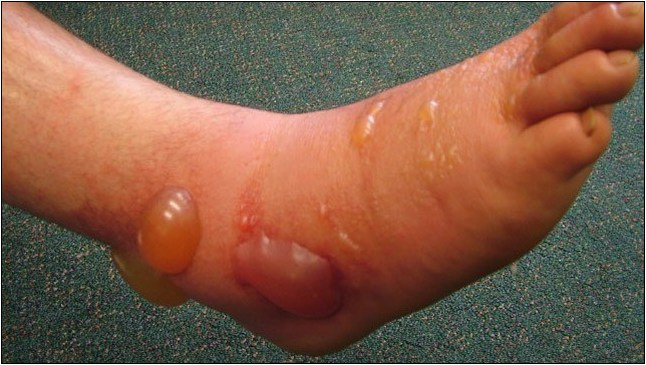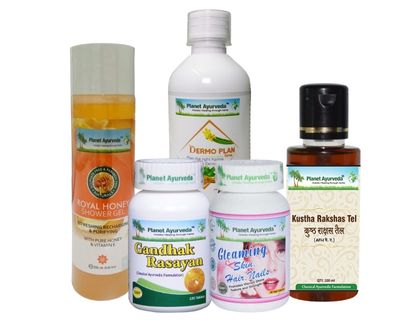What is Phytophotodermatitis? – Symptoms, Causes & Treatment in Ayurveda
Abstract
Phytophotodermatitis is a skin condition that arises from coming in contact with sun rays and other light-sensitizing botanical substances. In simple words, it can be termed as severe skin tan/ skin burn that does not go away on its own and you may need special methods to get over it. Normally it lasts for days to weeks but in some cases, it may last for years that needs medical intervention. In this article, we will get to know various herbal methods to get rid of Phytophotodermatitis.

Introduction
Phytophotodermatitis is a cutaneous phototoxic inflammatory eruption that occurs due to contact with light-sensitizing botanical substances and ultraviolet rays. Severe cases of Phytophotodermatitis with more than 30% of skin damage may need hospitalization. Phytophotodermatitis can become serious in some people which may lead to skin necrosis and bacterial and fungal infections.
Ayurvedic aspect
Ayurveda has not mentioned any skin disease that can occur due to exposure to sunlight because in very ancient times the ozone layer was strong enough to control harmful rays of the sun and no external agents were there to harm the ozone layer. But in today’s world, certain factors have caused thinning and holes in the ozone layer that directly cause harmful UV rays to impact on skin.
However, we can correlate the symptoms of skin rashes and pigmentation to other skin conditions of similar symptoms such as ‘Vicharchika’ which is a correlation of Eczema. Skin disorders including Vicharchika occur due to the aggravation of Pitta dosha that is due to the continuous practice of Virudh ahar (unhealthy food), improper lifestyle, and suppressing adharniya vega (suppressing natural urges).
Ayurveda has various herbs for the treatment of skin disorders and getting skin luster and glows back to its original natural form. No chemicals and steroids are used by us to do so. The results obtained by following ayurvedic remedies are far better and long-lasting than obtaining the temporary glow from certain chemicals usage.
We can also correlate and assume it to occur as a complication of some subtypes of ‘Kustha orgasm.
Causes
The cause of Phytophotodermatitis could be
● Coming in contact with chemicals and sunlight
● Photosensitizers
● Psoralen is present in citrus fruits
● UV rays
● Allergic reaction to certain drugs
● Result of some diseases like eczema, lupus, pellagra, etc.
● These cause damage to the skin cells and cause cell death
Symptoms
The symptoms appear twenty-four hours after the exposure of the skin to causative agents-
● Skin blisters
● Burning sensation
● Itching
● Discoloration of the skin (red to black)
● Inflammation
● Headache
● Fever
● Nausea
● Tenderness
● Irregular Skin patches
● Darkening of the skin
● Hyperpigmentation
The symptoms are seen to be aggravated when it comes in contact with heat, and sweat.
Diagnosis
● Diagnosis is confirmed on physical examination and taking a history of the patient.
●The patient will have a history of getting in contact with certain causative agents mentioned above along with exposure to sun rays.
● The skin will have irregular pigmented rashes and patches
● The more serious cases of skin necrosis and infection are ruled out after observing and taking skin and blood tests.
Treatment
The treatment involves both medication and prevention of skin from causes-
● Painkillers for pain and tenderness
● Steroids
● Topical creams
● Cold compress
● Avoiding exposure to skin irritants and sun
● Antihistamines
Herbal remedies for Phytophotodermatitis by Planet Ayurveda
Planet Ayurveda is a leading manufacturing company of herbal medicines in India. It has been preparing several herbal medicines that are successfully treating several diseases worldwide. Their preparations are 100% pure and also free from any kind of preservatives. Their chemical-free herbal formulations used in the management of Phytophotodermatitis are
Products Lists
- Gleaming Skin, Hair, and Nails Formula
- Gandhak Rasayan
- Kustha Rakshas tel
- Royal Honey Shower Gel
- Dermoplan Syrup
Products Description
1. Gleaming Skin, Hair, and Nails Formula
This wonderful acting ayurvedic formulation contains Manjistha (Rubia cordifolia), Pit papad (Fumaria officinalis), Chirayata (Swertia chiretta), Ghritkumari (Aloe barbadensis). This formulation capsule very effectively balances tridosha. Also supports the healthy pH of the skin which maintains skin health and treats skin disorders.
Dosage 2 capsules twice a day after meals
2. Gandhak Rasayan
These tablets are purely made from standardized extracts of Shudh Gandhak (Purified sulfur). These tablets help support healthy skin by eliminating toxins from the body and cleaning blood impurities. This product is specially prescribed for skin diseases such as ringworms, scabies, general itching, fungal infections, etc. Its anti-inflammatory properties help to reduce swelling and pain in affected areas of the skin and its antibacterial properties reduce the chances of skin infections. Gandhak being a rasayan has rejuvenating properties that promote health and nourishes the skin from the inside out making it glow naturally.
Dosage Take 2 tablets twice daily with water.
3. Kustha Rakshas tel
This is a classical formulation that is being used for a variety of skin-related issues. It contains Kushta (Saussures lappa), Chitraka (Plumbago zeylanica), Aragwadha (Cassia fistula), Saptparna (Alstonia zeylanica), etc. It helps to clear the toxins from blood by eliminating them from the body which will itself clear the skin’s darkening and support normal health of the skin.
Dosage Apply externally twice daily on the affected area of the skin
4. Royal Honey Shower Gel
This is a medicated shower gel to maintain glowy skin. It contains honey, vitamin E, aloe vera extracts, tea tree extracts, and many more ingredients that will help nourish your skin and will remove pigmentation. This is a paraben-free shower gel for the maintenance of the natural tone of the skin. Honey (pure) and aloe vera extracts add extra properties to this body wash.
Dosage Pour it on a sponge and scrub the body thoroughly, and bathe off with water.
5. Dermoplan Syrup
This herbal formulation contains herbs such as Manjistha (Rubia cordifolia), Giloy (Tinospora cordifolia), Neem (Azadirachta indica), Khadir (Areca catechu), Gorakhmundi (Sphaeranthus indicus), Chopchini (Smilax china), Sariva (Hemidesmus indicus), Haridra (Curcuma longa), Shobhanjan (Moringa oleifera), Shahtara (Fumaria officinalis). These all herbs are used for resolving skin issues from ancient times. They add a natural glow to the skin by removing darkness and toxins from the skin. They heal the skin from the inside which makes the skin glow from the outside naturally.
Dosage Have 2 teaspoons of syrup twice daily.
CONTACT PLANET AYURVEDA TO PROVIDE YOU THE COSTING / ORDERING AND DELIVERY INFORMATION AT – COSTING.PLANETAYURVEDA@GMAIL.COM OR CALL AT +91-172-5214040
Conclusion
Ayurvedic medicines are very effective in managing such problems. Why depend on steroids and surgeries for such conditions? Have side effects-free treatment with Ayurveda. They are safe to use and are very effective. So adopt ayurvedic methods and consult our ayurvedic doctors for better results. For any queries contact us at www.planetayurveda.com





